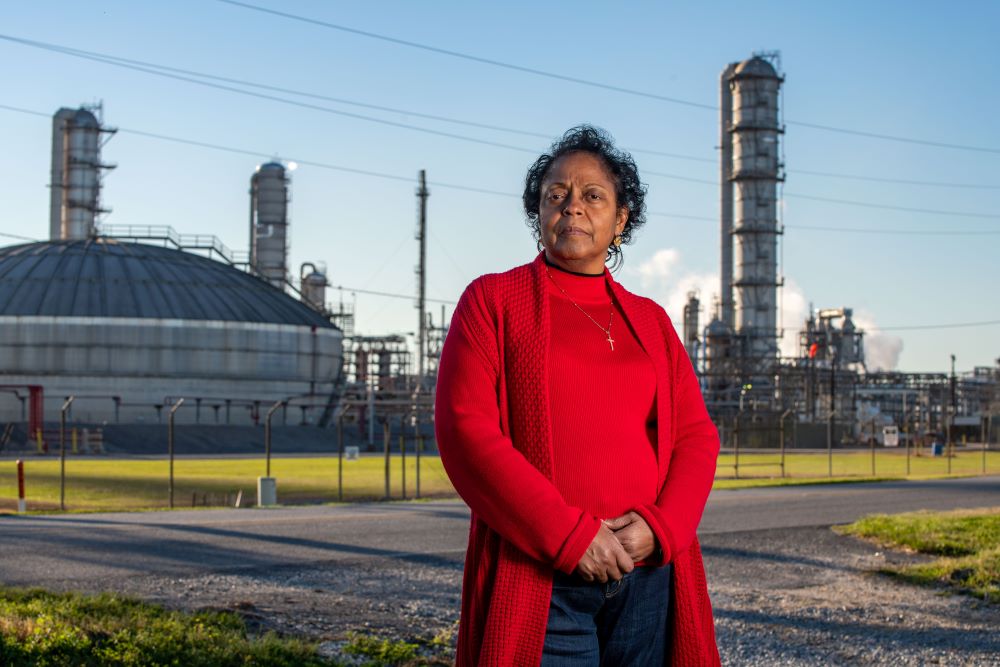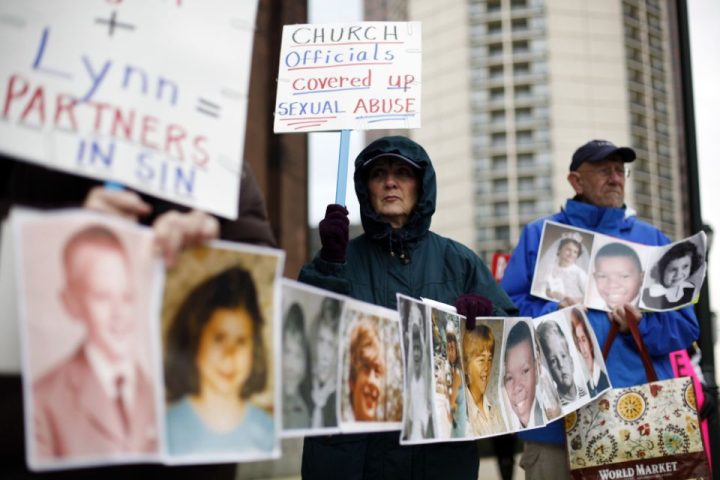
Sharon Lavigne has been called a modern-day Moses.
But the perhaps unlikely environmental prophet — a 71-year-old retired special education teacher — doesn’t want to lead her neighbors out of St. James Parish, Louisiana. She said she just wants area industries — which lie in the 85-mile corridor between Baton Rouge and New Orleans ruefully nicknamed « Cancer Alley » — to stop poisoning them.
So in 2018, Lavigne — a lifelong resident of St. James Parish, a civil jurisdiction about an hour from New Orleans, and a member of St. James Church, a predominantly Black Catholic parish in the Diocese of Baton Rouge with a 250-year history — founded a faith-based environmental advocacy group, Rise St. James.
When asked about her motivation, Lavigne’s answer is simple.
« I wanted to live. That’s why, » Lavigne told OSV News. « And I wanted to save my community. And I have to go through God to do it. … God is the only one that could stop all of this madness. You have to bring it to God. »
The decision profoundly altered her everyday existence. « It changed my life, » said Lavigne, « to the point where I don’t do anything — just try to fight the industry, and fight the politicians. »
A new Environmental Protection Agency (EPA) ruling announced April 6 — intended, the EPA said, to « reduce the number of people with elevated cancer risk by 96 percent in communities surrounding chemical plants, (and) cut more than 6,000 tons of toxic pollution per year » — may help Rise St. James and other environmental justice groups in the region in their fight.
It’s progress, said Lavigne. But she also added, « It’s not enough. »
Rise St. James describes itself as « fighting for environmental justice as it works to defeat the proliferation of petrochemical industries in St. James Parish, Louisiana. »
That proliferation in St. James and neighboring parishes — of more than 150 oil refineries, plastics plants and chemical facilities, 32 of which are in St. James — earned it the « Cancer Alley » nickname. It is a moniker shadowed by relentless concern about emissions from industrial plants, some of which occupy land once toiled by enslaved Blacks. Their descendants live within sight of towering, chemical-releasing smokestacks. Residents in St. Gabriel Parish report showers of yellow raindrops coating their yards, later scattered with dead birds.
Advertisement
A 2019 report by the New Orleans Times-Picayune and investigative website ProPublica noted « predominantly Black and low-income communities are acutely affected. » In 2021, the same team identified Cancer Alley as « the largest hotspot of cancer-causing air in the country » with the highest incremental lifetime cancer risk in some stretches reaching one in 210 — or 47 times the EPA’s acceptable risk.
Pope Francis reflected upon such impacts in his encyclical « Laudato Si’, » noting, « Exposure to atmospheric pollutants produces a broad spectrum of health hazards, especially for the poor, and causes millions of premature deaths. »
On Oct. 12, 2022, the EPA dispatched a « letter of concern » to Louisiana Department of Environmental Quality and Louisiana Department of Health officials. The Associated Press summarized the 56-page missive, reporting the « EPA has ‘significant evidence suggesting that the Departments’ actions or inactions have hurt and are hurting Black residents of St. John the Baptist Parish, St. James Parish, and … the Mississippi River Chemical Corridor. »
In February, the EPA sued the Japanese chemical company Denka. The agency asserted Denka’s LaPlace, Louisiana, operations « present an imminent and substantial endangerment to public health and welfare due to the cancer risks from Denka’s chloroprene emissions. »
Denka said chloroprene emissions were reduced 85% after it spent $35 million for equipment upgrades, and accused the EPA of « following a politically driven strategy to support the demands made by environmental activists and lawyers. »
Meanwhile, Lavigne and her neighbors remain stuck in the middle — without a way to otherwise explain a continuous spate of illnesses and deaths. « The Denka plant is still polluting over the limit, » Lavigne said. « Why can’t they make them pollute the limit? Because they’ll lose money.
Grassroots activism efforts might expect to face challenges — but under Lavigne’s leadership, Rise St. James has successfully advocated to defeat siting of a $1.25 billion Chinese-owned plastics plant, and the $2.2 billion development of land owned by South Louisiana Methanol. The latest clash is with Formosa Plastics’ proposed $9.4 billion chemical plant, which in 2022 had its air permits canceled. Formosa has been termed a « serial offender of environmental and human rights » by the Center for International Environmental Law.
« To protect the right to a clean, healthy, and sustainable environment of people living in Cancer Alley will require transformative changes to environmental law and policy in the U.S.A., » said David Boyd, a United Nations special rapporteur on human rights and the environment, and an associate professor at the University of British Columbia.
In a 2022 U.N. supplementary report, Boyd said he described Cancer Alley « as one of the world’s worst sacrifice zones. » In 2021, a large group of independent U.N. human rights experts urged a stop to industrialization of the area, citing « environmental racism. »
Lavigne — a recipient of the Goldman Environmental Prize and the University of Notre Dame’s Laetare Medal — visited the White House April 21 as President Joe Biden signed an executive order creating a White House Office of Environmental Justice.
Speaking with Biden at the ceremony, Lavigne « asked him to come to St. James. To Louisiana, » she told OSV News. « He told me he’d been out here already. But I said, ‘You haven’t been to St. James,’ and I invited him to come. And I told him that we have 12 industries within a 10-mile radius. »
The frustrations of struggling with megacorporations and politicians can sometimes be heard in Lavigne’s voice. « What’s more important? » she asks. « The plant, or our lives? What’s more important? A job, or our lives? Tell me. What’s more important? It’s hurtful. It’s hurtful. »
She realizes change takes time, but « we are losing our lives. »
« I can’t tell you how many environmental justice conferences I’ve been to where the advocates are unpaid, and they’re just trying to defend their communities, » said José Aguto, executive director of the Catholic Climate Covenant, a consortium of 20 national organizations formed in 2006 with the help of the U.S. Conference of Catholic Bishops. « And they are talking about their own personal contamination, and disease, and cancer, and amputations that they’ve had to have. And they’re still standing and they’re still fighting. They’ve been ignored for so long. »
Catholic Climate Covenant is partnering with Rise St. James and others to reduce that neglect.
« Sharon and I and others are working on creating a new vision for Cancer Alley, » Aguto said. « We’re actively looking at, or talking to, economic interests who might be interested in siting (locating there); who engage in activities that are either environmentally benign or environmentally beneficial. »
Tulane University’s Environmental Law Clinic is representing Rise St. James in a lawsuit against the St. James Parish, parish council and parish planning commission to halt future approvals of petrochemical plants. Filed on March 21, a June 16 response is expected. If the case is not dismissed, it moves to discovery stage.
Devin Lowell, clinical assistant professor of law at Tulane, said, « We do have sort of a unique fact pattern here of this development from plantation economies to petrochemical economies. … If we’re successful then that’s a new sort of tool on the toolbelt of folks fighting environmental racism all over the country. »
The complaint is 156-pages of frequently unsparing language: « As a result of the vestiges of the slavery in Louisiana and in St. James in particular, Plaintiffs’ members reside in some of the most polluted, toxic — and lethal — census tracts in the country. … The Defendants, obviously mindful of this historically segregated land distribution, have intentionally chosen to locate over a dozen enormous industrial facilities in the majority Black 4th and 5th Districts. » The parish is directly blamed for ignoring the pleas of its citizens and its duty to safeguard their well-being.
Speaking of corporations and councils, Lavigne explained, « If I don’t sue them, I can’t wake them up. They’re going to think twice when they go to another community to poison. »
In response to those who ask why she — or her neighbors — do not simply move away, Lavigne has a question of her own: « Why don’t they just come here? Why should I have to leave my home to let them be satisfied? To make profit off of my land? They’re looking to make profit off of us. They’re making us a sacrifice. »
To give up her home, then — to leave — would be a kind of surrender.
« No, » Lavigne said firmly. « I’m going to fight for what’s right, and fight for what’s mine. »



